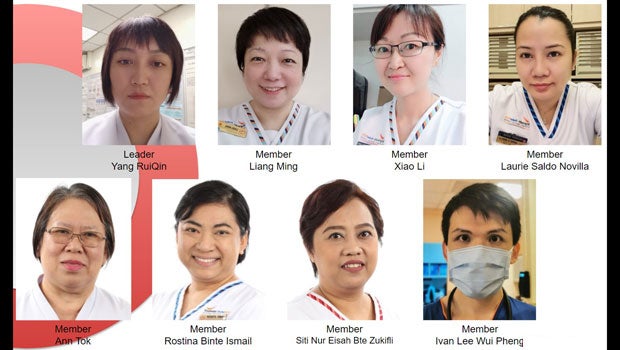
A team’s priority for patient safety and recuperation at the National Heart Centre Singapore (NHCS) achieves improved postoperative care for patients with multiple chest drains.
For patients at NHCS, regaining the ability to move around with minimal to no assistance early after surgery can quicken the time for healing successfully and reverting to their normal lives before the illness happened.
Early ambulation can aid in improved circulation, faster healing, decreased constipation and gas pain and prevent that any post-surgical complications in patients.
“A patient’s ability to ambulate independently is key for quicker recovery. Patients can become deconditioned after surgery due to prolonged bedrest,” detailed Ms Xiao.
But the struggle is real for patients to move around with chest drains attached after their post-surgery.
“Additional manpower is needed to carry the drains and also assist the patient to sit up, stand and walk,” explained team leader of the project, Nurse Clinician Yang Ruiqin.
Get updates on Tomorrow's Medicine in your mailbox!
Click here to subscribe
Observant care drives innovation
The challenge has since been overcome with an innovative drip stand developed by a 10-person NHCS healthcare team called the Creative Thinking Squad.
The situation: At least one to two nurses are needed to help a patient ambulate.
“There were apparent safety issues when the patients had to move around the ward,” co-leader of the project, Nurse Clinician Liang Ming detailed. “For the safety and optimal recovery of our patients, we were eager to enhance the existing ambulation equipment.”
A new drip stand was successfully produced and rolled out after several trials with insights from the team’s patient care experience and determination. With the new drip stands, patients can carry out simple tasks independently such as walking and going to the toilet. Staff assistance for patient ambulation has also reduced, as patients do not require help in holding the chest drains when moving about.
Additionally, patients were able to regain mobility faster after surgery. It goes a long way to improve patients’ mood, feelings of independence and self-esteem for their future healing journey - the priceless returns the team sought to achieve for patients.
The final product is testament to the team’s foresight. Fabricated with five legs and mobile C-shaped hooks, the drip stand now has greater stability and enhanced functional flexibility which can hold multiple chest drains.
The team’s attention to details won them the highest accolade awarded by Singapore Productivity Association for quality improvement. Before and after: The new stand has five legs instead of four for increased stability. The new drip hook design also allows for the chest drains and tubes to be hung neatly.
Before and after: The new stand has five legs instead of four for increased stability. The new drip hook design also allows for the chest drains and tubes to be hung neatly.
Significant results from simple idea translated into action
With minimal knowledge of technical design, the team had to get creative when working on the project from December 2019 to January 2021, even roping in family help for the most challenging part of the project: Technical drawing of the ideal drip stands.
“I asked my brother-in-law to help me draw up the first model of the drip hooks because he’s an engineer,” shared Ms Yang. “I later modified the model drawings based on our requirements using Powerpoint.

The new and improved drip hooks to fit the different types of chest drains a patient carries while ambulating.
This project had profound ripple effects.
With improved post-operative early ambulation, patients gained a shot at better recovery. This translates to earlier discharge, cost savings all round, heightened job efficiency for the healthcare team and quicker bed turnaround.
Other definitive benefits of the project outcomes for the team were intangible but deeply felt. Patients were more confident in their recovery journeys, encouraged by their postoperative mobility aided by the newly improved chest drain holders.
The project is enjoying continuous improvements and spin-offs. There is potential in further bedside usage with modification of the drip stands, the Department of Cardiothoracic Surgery has shown interest to procure the modified drip stands, and there are plans to share the product at various nursing platforms.
The 10 team members of the Creative Thinking Squad, with the exception of APN Xiao Li, are from Ward 56 of NHCS:
Project Facilitator, Senior Nurse Manager Foong Jia Yi
Project Facilitator, Assistant Manager, Quality Management/ Operations (Management Information & Performance), Jacqueline Huo
Project Team Leader, Nurse Clinician, Yang Ruiqin
Project Co-leader, Nurse Clinician, Liang Ming
Nurse Clinician, Anne Tok
Assistant Nurse Clinician, Rosnita Binte Ismail
Assistant Nurse Clinician, Laurie Saldo Novilla
Senior Enrolled Nurse, Siti Nur Eisah Binte Zulkifli
Physiotherapist/Cardiac Physiotherapy Services, Ivan Lee
Get updates on Tomorrow's Medicine in your mailbox!
Click here to subscribe













 Get it on Google Play
Get it on Google Play